Dec 18, 2025
Dec 18, 2025
by H.N. Bali
Remembrance of October 31 - Part I
The evil that politicians do lives on and on....
The good is oft interred once they’re gone
Experts in their fields tell me that a woman (before marriage) is judged by the suitors she hobnobs with, a man by the company he keeps and a politician by the number of times he can get his photograph appear in newspaper columns. This rough and ready guide is in no way invalidated by the invasion of 24x7 TV. The electronic media, don’t forget, is (very fortunately) extremely ephemeral. (Do you remember the first picture you saw on the TV news this morning or the name and face of yesterday’s anchor? In fact, the only thing I pay attention to, are the attractive faces of TV news anchors, which are rare indeed, and practically nothing else.)
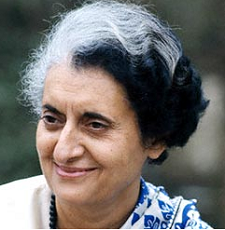 Getting up on Wednesday, October 31, and sipping my tea I picked up Indian Express, usually the first paper I look through. Thumbing through its pages I chanced upon one picture of Indira Gandhi after another till I recalled that it was the day, in 1984, when she was gunned down by her own guards. The Congress Party has declared it as the day of her martyrdom. Page after page carried a photograph of her. I counted six of them. These were almost half page ads. (Newspapers would love to have each day of the year named after some national martyr. That would assure them handsome advertising revenue.) The pictures I’m referring to, was Indira Gandhi with her familiar trademark of a white streak of hair amidst a bumper crop of jet black on a face which must have been centre of attention when she was young.
Getting up on Wednesday, October 31, and sipping my tea I picked up Indian Express, usually the first paper I look through. Thumbing through its pages I chanced upon one picture of Indira Gandhi after another till I recalled that it was the day, in 1984, when she was gunned down by her own guards. The Congress Party has declared it as the day of her martyrdom. Page after page carried a photograph of her. I counted six of them. These were almost half page ads. (Newspapers would love to have each day of the year named after some national martyr. That would assure them handsome advertising revenue.) The pictures I’m referring to, was Indira Gandhi with her familiar trademark of a white streak of hair amidst a bumper crop of jet black on a face which must have been centre of attention when she was young.
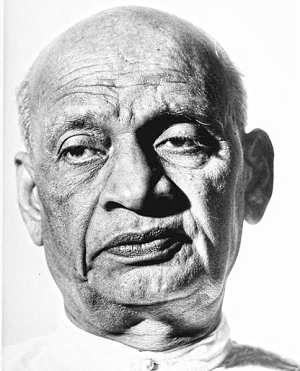 Suddenly, I chanced upon another half page ad on the same day. That was to remember Vallabhai Patel - a now-forgotten man whom India owes an enormous debt of gratitude. That was to remember the Iron Man’s birthday. Thank God someone had spared a thought for him too.
Suddenly, I chanced upon another half page ad on the same day. That was to remember Vallabhai Patel - a now-forgotten man whom India owes an enormous debt of gratitude. That was to remember the Iron Man’s birthday. Thank God someone had spared a thought for him too.
Is that, I asked myself, how two leaders of India are reckoned in national memory i.e., in the 6:1 ratio: Patel who welded the country into a nation state as it never was in its long, chequered history and Indira Gandhi – the one who did everything possible to ruin the democratic character of our polity as much as the Founding Fathers of our Constitution laid the foundations of that polity? One is six times more well-promoted and well-preserved than the other. Let’s have a look at what both did for their country in their lifetime.
Let me deal, first, with the lesser mortal: Sardar Vallabhbhai Patel whose greatest contribution to India was the integration of all Indian States into the Indian Union. This feat of his is often compared to Chancellor Bismarck’s creation of the German Empire in 1871. This comparison - as most comparisons are - is fatuous indeed. Patel's handiwork has no parallel in world history for several reasons. Bismarck had just about a dozen states to be welded into the German body politic. Patel had 564 to handle - a few of them together larger than the size of whole of Germany. Patel, moreover, had to reckon with not only the forbidding odds within but also daunting obstacles from without. The departing devious British spared no effort to egg the rulers of Bhopal, Hyderabad and Travancore on mischief's course. Nothing indeed would have gladdened Whitehall more than to see the Indian subcontinent parceled into at least half a dozen dominions, tied to the apron strings of the so-called Commonwealth of Nations. The German Iron Chancellor had no such obstacles to reckon with.
Iron Fist in Velvet Glove
Despite their common goal, namely, unification of their respective countries, the means adopted by the two men were as different as chalk is from cheese. The German Chancellor, as brought out by historian A J P Taylor "was a political conspirator... by nature and by experience". Patel behaved throughout his handling of the Indian princes, as a thorough-bred Gandhian. He was not the man to resort to conspiratorial stratagems to achieve his end - howsoever necessary in the country's larger interests. While Bismarck's gift was, in Taylor's words, "in packing the cards, not in playing the hand", Patel dealt his hand fair and straight. If the Iron Man of India had a model to emulate, it was the homespun diplomacy practiced and preached - some two thousand years ago - by Chanakya which enunciated the fourfold techniques of sama (persuasion), daam (money), dand (punishment) and bhed (division). So he cajoled, he flattered and he threatened the former rulers to pay heed to the call of times.
It was, however, the technique of sama (persuasion) that he used the most. His message to Indian princes and prince-lings - the latter far outnumbered the former - was loud and clear: your days as rulers of outmoded feudal regimes are over and it is in your larger interests to gracefully dismount the high horses.
Patel knew that the people of these states were unmistakably on his side and that these petty feudal anachronisms were awaiting to be dumped on the dust-heap of history. His warning to them was thunderingly ominous: "If any member of the Princely Order desires to establish Paramountcy, he is mistaken. They cannot establish that Paramountcy which the British are relinquishing. Paramountcy vests with the people". Of course, the stratagem of daam (money) he applied aplenty, not by bribing the princes but offering them handsome privy purses to ensure a decent living. (That Mrs Gandhi in a populist fit chose to renege on these constitutionally guaranteed promises was one of her unforgivable lapses).
The most eloquent tribute to Patel's Gandhian approach of achieving a great goal by equally lofty means came (most unexpectedly) from Nikita Khrushchev who, in 1956, in his historic visit to India said (as recorded by KPS Menon): "You Indians are an amazing people! How on earth did you manage to liquidate the Princely Rule without liquidating the Princes"? Khrushchev, of course, as a died-in-the-wool Communist was thinking of the Soviet experience of liquidating Kulaks while confiscating their land holdings. What price Soviet Russia paid for this ruthlessness, Khrushchev, fortunately, didn't live to see. The means deployed by the ruthless Soviet leaders ultimately caught up with them.
Against Forbidding Odds
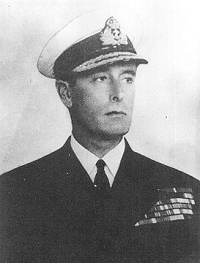 Unification of the 564 princely states in the Dominion of India was almost entirely Patel's achievement. On the eve of his departure from India - having done all the conceivable mischief he could - Lord Mountbatten wrote to Patel on June 19, 1948.
Unification of the 564 princely states in the Dominion of India was almost entirely Patel's achievement. On the eve of his departure from India - having done all the conceivable mischief he could - Lord Mountbatten wrote to Patel on June 19, 1948.
There is no doubt that by far the most important achievement of the present government is the unification of the states into the Dominion of India. Had you failed in this, results would have been disastrous. But since you succeeded, no one can see the disastrous consequences that you avoided. Nothing has added to the prestige of the present government more than the brilliant policy you have followed with the states (Italics added).
Mountbatten's above-mentioned tongue-in-cheek tribute almost gives away the British anguish at Patel's success. Had he failed in this exercise, instead of the India of today, we would have had a cluster of warring Dominions in the subcontinent. If at the spiritual level the message of Vedanta has kept India united from the north to the south and from the east to the west, it is Patel's far-sighted unification exercise that knit Indian society in one enduring political entity.
He had, for instance, scotched the game plan of the Nawab of Bhopal to group certain princely states to join him to claim a separate dominion from the British. He knew Hyderabad was an "ulcer in the abdomen of India", and it could turn cancerous and spread further to reach dangerous proportions. As such he performed a neat surgical operation. Interestingly, he was able to size up the military position of Hyderabad far better than India's then reigning defense strategists. The story goes that he wagered on the operation Police Action against Hyderabad ending within a week which the then Commander-in-Chief (Gen Roy Bucher) had forecast would take months of intense fighting.
Mountbatten is quoted to have said in one of his rare honest moments - and there weren't many in his life - and this is recorded in Great Divide - "I'm glad Nehru has not been put in charge of the new States' Department, which would have wrecked everything".
Administrator Par Excellence
Vallabhbhai Patel was, above all, a great administrator - a gift that Nehru was almost completely devoid of. He believed in implementing - in doing things - and not merely dreaming about them. He, more than anyone else in post-independence India, realized the crucial role that civil services play in administering a country, in not merely maintaining law and order, but running the institutions that provide the binding cement to a society. He, more than any other contemporary of his, was aware of the needs of a sound, stable administrative structure as the lynchpin of a functioning polity. The present-day all-India administrative services owe their origin to the man's sagacity. In a letter addressed to Nehru he wrote on April 27, 1948:
An efficient, disciplined and contented service assured of its prospect as a result of diligent and honest work is the sine quo non of a sound administration under a democratic regime even more than an authoritarian rule. The service must be above party. (Italics added).
Breathtaking indeed was the man's vision and his grasp of the ground realities and also the foreboding of the possible abuses that could - as they indeed have - set in. His emphasis on efficiency and discipline instead of the much-abused seniority and pliability to political needs should be the guiding principles for sound administration of the polity. The prescience that Patel displayed in emphasizing that the civil services "must be above party" is remarkable. Look at the mess we made in departing from this sage advice.
Master of Realpolitik
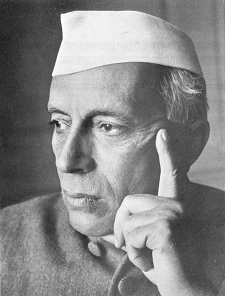 Jawaharlal Nehru always thought himself to be endowed with a world vision and that most (if not all) of his colleagues in the Government were parochial in their perspectives. No wonder, he reserved for himself the portfolio of external affairs both in the interim Government and in all the Governments that he headed after independence till his death. After all, as the author of Glimpses of World History he had reasons to believe that he alone, in his Government, could grasp the historical forces at work when Western imperialism was on the retreat and new nation states were emerging in Asia. It is a pity, however, that despite all his so-called progressive instincts, Nehru completely misjudged the implications of the rise of Communist China in world affairs. Patel's grasp of international events, on the other hand, was imbued with a down-to-earth orientation rooted in realpolitik. He had been informed by India's Political Officer in Sikkim how the Chinese had distributed thousands of copies of a map where Tibet and China were shown as the palm of a human hand, and Ladakh, Nepal, Sikkim, Bhutan and NEFA (the present Arunachal Pradesh) as its five fingers. His stand was unequivocal: "We shall not fail to arm ourselves with the requisite armed force whatever it may cost for the protection of our land."
Jawaharlal Nehru always thought himself to be endowed with a world vision and that most (if not all) of his colleagues in the Government were parochial in their perspectives. No wonder, he reserved for himself the portfolio of external affairs both in the interim Government and in all the Governments that he headed after independence till his death. After all, as the author of Glimpses of World History he had reasons to believe that he alone, in his Government, could grasp the historical forces at work when Western imperialism was on the retreat and new nation states were emerging in Asia. It is a pity, however, that despite all his so-called progressive instincts, Nehru completely misjudged the implications of the rise of Communist China in world affairs. Patel's grasp of international events, on the other hand, was imbued with a down-to-earth orientation rooted in realpolitik. He had been informed by India's Political Officer in Sikkim how the Chinese had distributed thousands of copies of a map where Tibet and China were shown as the palm of a human hand, and Ladakh, Nepal, Sikkim, Bhutan and NEFA (the present Arunachal Pradesh) as its five fingers. His stand was unequivocal: "We shall not fail to arm ourselves with the requisite armed force whatever it may cost for the protection of our land."
Till events proved how woefully wrong Nehru was in his perceptions of the Communist China, he was unflinching in his belief that India had nothing to fear from the Chinese. Finally, came the 1962 aggression which shattered once for all — alas, far too late — the roseate world view of the Prime Minister when he admitted in Parliament that As his otherwise-sympathetic biographer S. Gopal notes: “'we were getting out of touch with reality in the modern world, and we were living in an artificial atmosphere of our own creation.”
It is pertinent here to note Patel's warning to Nehru as early as June 1949, when he wrote to the Prime Minister: "I anticipate that as soon as the Communists have established themselves in the rest of China, they will try to destroy its (Tibet's) autonomous existence". Needless to add, this eminently sane warning had no effect on Nehru's formulation of India's policy towards Tibet. The Prime Minister thought that he alone could decipher world developments and knew where lay India's strategic interests.
There was another opportunity when Nehru could take his blinkers off. In a Cabinet meeting in November 1950 to discuss India's policy towards Tibet, Nehru's colleagues tried to dent his perception that the Himalayas weren't the impregnable fortress as the popular folklore had it. KM Munshi reminded Nehru how in the seventh century Tibetan invaders had attacked Kanauj from across the borders. Nehru was, as usual, dismissive about any view that ran counter to his thinking. After that fateful meeting Patel wrote to Nehru that famous letter on November 7, 1950, in which he penned the prophetic warning about China's intentions. Had the self-opinionated Nehru cared to think through Patel's warning, India's history would have taken a different course. The Iron Man said in the letter:
The Chinese Government has tried to delude us by professions of peaceful intentions. My own feeling is that at a crucial period they managed to instill into our Ambassador a false sense of confidence in their so-called desire to settle the Tibetan problem by peaceful means... The final action of the Chinese, in my judgment, is little short of perfidy. The tragedy of it is that the Tibetans put faith in us ... we have been unable to get them out of the meshes of Chinese diplomacy or Chinese malevolence ... it appears that we shall not be able to rescue the Dalai Lama.... The Chinese do not regard us as their friends... and their last telegram to us is an act of gross discourtesy not only in the summary way it disposes of our protest against the entry of Chinese forces into Tibet, but also in the wild insinuation that our attitude is determined by foreign influences. It looks as though it is not a friend speaking in that language but a potential enemy.
I don't think there has been in the history of international relations a more uncanny assessment of a nascent Communist power's longer-term imperial designs than Patel's then-confidential note on China's future intentions. Nehru disregarded the warning at the cost of national humiliation twelve years later.
Isn't it a cruel twist of fate - if not a downright tragedy - that half a century after his death, Patel's name is consigned to the lengthening list of had-beens. And yet if the man had not been around in the formative few years of independent India - and Nehru had unquestioned say in shaping India's destiny - there wouldn't have been the India that you and I live in.
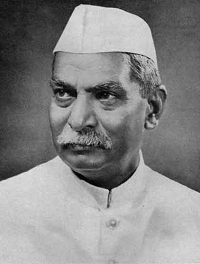 We, as a nation, have a penchant for almost hysterical overreaction when the great pass away followed by a perpetual fit of forgetfulness. Dr. Rajendra Prasad, for instance, noted in his diary on May 13, 1959. "That there is today an India to think and talk about is very largely due to Sardar Patel's statesmanship and firm administration". And he added with unusual prescience, "yet, we are apt to ignore him". And that is exactly what we have done - to our shame.
We, as a nation, have a penchant for almost hysterical overreaction when the great pass away followed by a perpetual fit of forgetfulness. Dr. Rajendra Prasad, for instance, noted in his diary on May 13, 1959. "That there is today an India to think and talk about is very largely due to Sardar Patel's statesmanship and firm administration". And he added with unusual prescience, "yet, we are apt to ignore him". And that is exactly what we have done - to our shame.
Patel finished his historic task of redrawing the map of India - a task that defied great emperors like Ashoka and Akbar. He was a sick man ready for the call of his Maker. What were Patel's thoughts when on December 12, 1950 he took the last flight of his life to Bombay. His doctors had advised him to be away from Delhi's cold. He was critically ill. He knew the end was approaching. Manibhen, Patel's daughter, who was his life-long companion records that "half awake, half in stupor, his mind was full of thoughts". What was he thinking? Were his thoughts centered on questions that troubled his conscience: how did all this come about - the division of the motherland and all the bloodshed and bitterness? Also, in such moments he would have asked himself what the future held out for his country that he strove so hard to serve. Pity indeed that the man didn't live for "finding answers to (these) difficult questions".
The vision of things that Sardar Patel had, transcended the all-too-obvious limitations of the present; it went far beyond into the realm of future possibilities than Nehru's perception of situations. Whether Nehru acknowledged it or not, this profound difference of attitudes constituted a hidden strain in their working relationships. Self-convinced as Nehru always was about the correctness of his stance on international affairs, he couldn't have taken kindly to Patel's strong dissenting views and perceptions about China. In a little over a month after his letter dated November 7, 1950, warning Nehru about the Chinese intentions, Patel passed away. In Parliament, Nehru stood to praise the "great story" of Patel's life, which he said "history will record ... in many pages and call him the builder and consolidator of the New India". Indeed. Nehru was spontaneous, but not honest. He didn’t want the President Rejendra Prasad to attend the funeral. And have it mentioned in the memoirs of his Secretary, N K Seshan that he had addressed a strongly-worded letter to Patel almost on the lines of his January 1948 letter to Gandhi to the effect that either of them has to quit to give the country a coherent policy. Seshan thinks that Patel would immediately have resigned from the Cabinet after getting the letter. The day it was to be delivered to him, Patel died. And with that ended the strong note of dissent within the Cabinet over Nehru's policy towards China. For the country, however, it proved to be most unfortunate.
With Patel gone there set in the decision-making process of the Government of India what is referred to in management jargon as groupthink - a subject that was first studied in detail by Irving Janis. Without open disagreement, any decision-making group becomes cohesive but it also systematically shuts out divergent opinions. The result is that any new information that surfaces is deemed inappropriate or irrelevant and hence, summarily dismissed. Janis cited the 1962 Bay of Pigs misadventure of the United States against Cuba as an example of groupthink. President Kennedy and his close advisors did not (willingly or unwillingly) tolerate dissent about the situation. The result was the disastrous military intervention based on unquestioned and unexamined assumptions. This is exactly what happened in 1962 regarding the Government of India's stand on the Chinese threat to our northern borders. Would Patel have allowed the above to transpire if he was still around. Another 'if' of history....
Remarkably sharp were the man's insights into the problems faced by the country, most of which didn't strictly fall in the ambit of his assigned responsibilities in the Cabinet. He pointed out, for instance, how organized labour in the country should be oriented on truly industrial lines to contribute to India's economic growth. He was blunt enough to remind the union leaders that their methods of resorting to strikes to stop production at the slightest pretext just to prop up their own leadership, would do immense harm to the long-term cause of labour by throttling industrial growth. (The developments in West Bengal in last thirty odd years bear eloquent testimony to the Sardar's prescient diagnosis of the industrial malady-in-making).
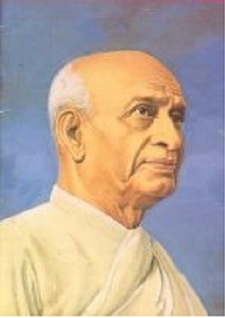 There is, today, an on-going debate about how to set things right in our society. Where do we begin? From the top or below or the middle? Invariably, those called upon to provide leadership choose their areas of operation lending maximum possible visibility with a view to remaining in public limelight. It is interesting — and instructive — to recall what Sardar Patel rated as the most significant work in his life. He was asked this question in 1948 when the then Bombay Corporation organized a civic reception in his houour. His reply was most unexpected — not the integration of States in the Indian Union, not the creation of administrative services to hold the polity together, not to uphold the rule of law without which the nascent State might have suffered a body blow, but — hold your breath — his tenure (between 1917 and 1922) and the work done during it, as the Chairman of the Sanitary Committee of the Ahmedabad Municipal Board. That was an "achievement" of his life that he recalled with pride.
There is, today, an on-going debate about how to set things right in our society. Where do we begin? From the top or below or the middle? Invariably, those called upon to provide leadership choose their areas of operation lending maximum possible visibility with a view to remaining in public limelight. It is interesting — and instructive — to recall what Sardar Patel rated as the most significant work in his life. He was asked this question in 1948 when the then Bombay Corporation organized a civic reception in his houour. His reply was most unexpected — not the integration of States in the Indian Union, not the creation of administrative services to hold the polity together, not to uphold the rule of law without which the nascent State might have suffered a body blow, but — hold your breath — his tenure (between 1917 and 1922) and the work done during it, as the Chairman of the Sanitary Committee of the Ahmedabad Municipal Board. That was an "achievement" of his life that he recalled with pride.
Work done with dedication — work that affects the life of ordinary men and women — yields satisfaction that transcends the heady public recognition, believed the Iron man of India.
He was indeed a man made of steel and cast in granite about whom one of the stalwarts of the ICS — the solid frame that supported the Raj — said that "if the dead body of the Sardar were stuffed and placed on the chair, he could still rule".
We Indians are notoriously ungrateful when it comes to true remembrance of our benefactors. Yes, we have the shradh ceremonies for our dead. We have a national holiday in the name of Mahatma Gandhi. All these we have converted into hollow rituals devoid of meaning and sanctity. If we owe to Vivekananda the first stirring of pride in our past to give us that precious commodity called self-respect, and to Gandhi, the awakening in a subjected people of the long-dormant urge to be free, it is to Patel that we owe our place on the political map of the world.
And we had just one ad in remembrance of Patel, and six for Nehru’s daughter on October 31? What does it say about our sense of history?
Continued to "Remembering Indira Gandhi" - Part II of this essay.
15-Nov-2012
More by : H.N. Bali

|
Sir, nice |

|
very appropriate homage let the 24 hour media understand the freedom was due to such people we forget people like patel and lalbahadur |

|
Outstanding article, we will remember even you sir for reminding us what we had forgotten. |

|
"I haven't myself been able to access Nehru's last letter to Patel. The collections of Patel's papers too are silent on the issue. My source of information is N K Sehan's book With Three Prime Ministers which is his memoirs published in 1980's. Seshan was one of Nehru's secretaries and recalls his association with Nehru, Indira and later with Rajiv. He mentions about it and how he went to Bombay to hand-deliver the letter. He says - I'm quoting from memory - that when he reached the place where the sick Patel was staying, he discovered that he died that very morning. Sehan further adds that had Patel got that letter he would certainly would have immediately resigned. After reading Seshan's memoirs I tried hard to get the text of the letter but without any success. Later I learnt that the letter is part of the classified papers which are now in the custody of Sonia Gandhi. I can hazard a guess about the contents. There was in late 1950 an ongoing conflict of opinion between the two leaders based on differing perceptions about Nehru's policy toward China and their conflicting ideas about India's strategic stake in Tibet. It is now an open secret the the famous November 7, 1950 letter of Patel to Nehru vindicating their differing stances towards the official policy towards China was drafted by Sir Girija Sahnkar Bajpai, then Secretary General in the Ministry of External Affairs. Nehru won't bother to consult his own advisers in the Government because of his haughty aloofness in foreign affairs because he was self-convinced that he knew all. So, Bajpai used Patel to communicate his views to the PM. Hence, it is my guess - I could completely off-track - that the subject matter of the last letter was India's China policy. Nehru must have in that case reminded Patel in strident notes about turf demarcation or even who was the boss. I've no information beyond the above. Possibly, some better-informed reader could add something. |

|
Dear Sir, Could you please provide some more information on what the letter content were - about the letter referred to in this article in the following lines: "He didn’t want the President Rejendra Prasad to attend the funeral. And have it mentioned in the memoirs of his Secretary, N K Seshan that he had addressed a strongly-worded letter to Patel almost on the lines of his January 1948 letter to Gandhi to the effect that either of them has to quit to give the country a coherent policy. Seshan thinks that Patel would immediately have resigned from the Cabinet after getting the letter." |

|
Sir, I am overwhelmed |

|
Sir, A brilliant article and informative too ! Every Indian needs to read this. |

|
A scholarly and erudite article this, Rajendra ji. I am sharing on Google +. Regards, Julia |

|
Very much appreciated on highlighting Sardar Patels being a key man to unite India. Dynastic approach has been responsible for shadowing Patel. You have witnessed those years of upto 1950 and are able bring it forward to readers. It will be pity that in later years he would be unknown - and political parties will be responsible. |

|
Brilliant article highlighting the first "real" leader of modern India.My disappointment about the current lot of people in powerful positions be it politics, administration or Industry is how mediocre they have all become.I thought BJP at least will be a party with a difference but then it was also lead down the garden path by 2 of its "leaders" advani and vajpayee who have simply perpetuated the disastrous approach of the dubious Gandhi family when they had the first real taste of governing this country in 1999-2004.If advani had been one quarter of a man of Vallabhai Patel, he could have changed the approach.It is time the BJP jettison these mediocre "leaders", bring in fresh blood by looking around outside who truly believe in taking the country forward and willing to sacrifice self towards nations good.Even today BJP can be the only party that can bring change be national in outlook and deed but it will not do if they continue with the same jelly beaned empty talking breed of confused leaders like Advani.jaitley,Sushma,ananthkumar and the ones holding on to their cloth tails. |

|
Yet another wonderful article on one of the greatest sons of India. In the blackest of days in our history every Indian should fervently pray for the rebirth of this iron man to rescue us from the rule of pigs and pygmies. |